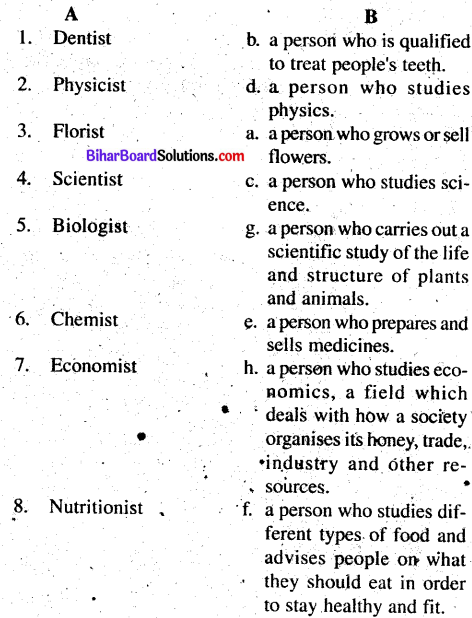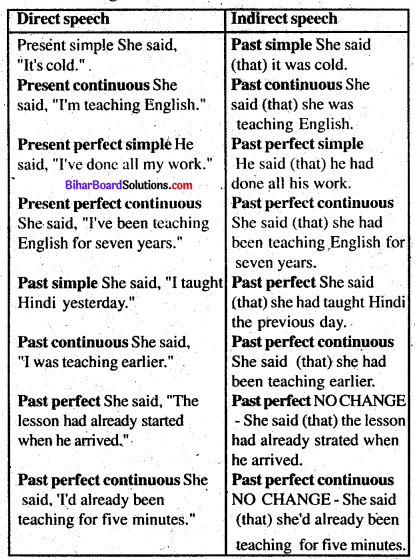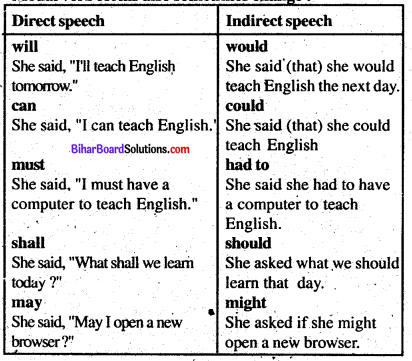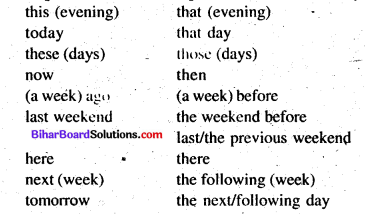Looking to improve English skills and gain more subject knowledge then the best resources that you can use here is Bihar Board Solutions for Class 8 English Chapter 6 Tess Buys a Miracle Questions and Answers. In the Bihar Class 8 English Chapter 6 textbook solution pdf, subject experts covered all types of questions and answers related to the topics, quick notes, summary, solved & unsolved exercises, etc. If you are planning to prepare Chapter 6 via textbook, then you’re suggested to go with this Bihar Board Class 8 English Book Chapter 6 Tess Buys a Miracle Textbook Solutions PDF for better understanding and preparation.
BSEB Bihar Board Class 8 English Book Solutions Chapter 6 Tess Buys a Miracle
English Subject experts who are having max years of experience prepared this Bihar Board Solutions for Class 8 English Chapter 6 Tess Buys a Miracle. They have explained all the topics covered in the board prescribed latest syllabus in a simple way to understand easily. So, students can prepare Chapter 6 English from this Bihar Class 8 solutions book PDF. Download the Bihar Board Class 8 English Chapter 6 Workbook Solutions PDF by accessing the below links and learn properly for the final exams to score well.
Bihar Board Class 8 English Tess Buys a Miracle Text Book Questions and Answers
A. Warmer
Miracles are lucky or happy things or events which happen in our favour beyond all expectations or posssibilities.
Question 1.
Have you ever seen lucky things that happen to you or to someone known to you ? Talk about them to the class.
Answer:
No, I haven’t seen luck things happening to me. But I have heard stories of such happenings.
Question 2.
Can you make lucky things happen whenever you want ? If ytz, what good things will you like to happen in your life ?
Answer:
No, it is not possible for me. I can’t make lucky things happen. Whenever I want. If I could do such things, I would become the richest man of the world.
B. Let’s Comprhened
B. 1. Think and Tell
Question 1.
Who was sick ?
Answer:
Andrew was sick.
Question 2.
How did Tess know that her brother was sick ?
Answer:
She overheard her parents talking about this.
Question 3.
Who operated on her brother ?
Answer:
Dr. Armstrong, a neuron surgeon.
Question 4.
Which words, in your opinion, describe the character of Tess ?
Answer:
The faith of a little child’.
B. 1. 1. Say whether the following statements are ’True’ or ‘False’.
Question 1.
- Tess’s parents were very hopeful that their son would recover from his illness.
- Tess believed that miracles are things that one can buy.
- Tess didn’t want to use her own money to buy a miracle to save her brother.
- Tess’s brother needed a surgical operation.
- The chemist’s brother Wanted to help Tess.
- Dr. Armstrong made Tess believe that it was possible for her to buy the miracle she needed.
- Tess’s parents had to spend a lot of money on Andrew’s operation.
- Dr. Armstrong was not a kind and sympathetic man.
- Tess’s parents saved Andrew’s life,
Answer:
- False
- True
- False
- True
- True
- True
- False
- False
- False
B. 2. Think and Write
Tick (✓) the right answer.
Question 1.
Tess went to the drugstore
(a) to buy a miracle
(b) to meet the chemist
(c) to meet the Chemist’s brother
Answer:
(a) to buy a miracle
Question 2.
The doctor was impressed by
(a) Tess’s concern for her brother
(b) Tess’s way of speaking
(c) Tess’s love for her parents
Answer:
(a) Tess’s concern for her brother
Question 3.
Only a miracle could save Andrew’s life because
(a) the disease was incurable
(b) his parents hadn’t enough money to bear the cost of his treatment
(c) there were no good doctors available at that place
Answer:
(b) his parents hadn’t enough money to bear the cost of his treatment
B. 2. 1. Answer the following questions.
Question 1.
How much money did Tess have ? How do you think she got this money ?
Answer:
Tess had one dollar and eleven cents. She had saved this money from her parents as her pocket money.
Question 2.
Did Tess know what a miracle is? Give reasons for your answer.
Answer:
No she went to drugstore to buy a miracle. It proves that she didn’t know what a miracle meant.
Question 3.
What is your opinion about Dr. Armstrong ?
Answer:
Dr. Armstrong was a kind and sympathetic man.
Question 4.
How did Tess come to know that her brother was sick?
Answer:
She knew it from her parents. They talked each other about this.
Question 5.
What did Tess want to know from the chemist ?
Answer:
Tess wanted to know from the chemist, how much a miracle costs.
Question 6.
Who in your opinion, helped Andrew recover from his illness ?
Answer:
Dr. Armstrong, a neuro surgeon, helped Andrew to recover from his illness in a hospital.
C. Word Study
C. 1. Fill in the blanks with the suitable words from the box.
(drugstore, Chicago, miracle, operated, coins, back)
- Within a few weeks Andrew was ………….. at home.
- My brother has just arrived from
- Dr. Armstrong ………. on her brother.
- Tess made her way to
- Only a ………….. can save him.
- There were few ……….. in the jar.
Answer:
- back
- Chicago
- operated
- drugstore
- miracle
- coins.
C. 2. Word ending in ‘-ist’.
Words that end in ‘-ist’ such as guitarist, artist and recep-tionist indicate people’s profession or their specialised area of work.
Study the words in column A indicating professions and match them with what they do given in column B.

Answer:

C. 3. Given below are groups of words Identify and encircle in each group the wort that does not belong to the rest.
One has been done for you.
- disease, doctor, treatment, confident, diagnosis.
- medicine, cupboard, table, chair, stool.
- annoyed, irritated, loving, angry, cross.
- wife, husband, daughter, son, friend.
- well dressed, smart, elegant, unkempt, well-known.
Answer:
- confident
- medicine
- loving
- friend
- well known.
D. Grammar
Direct and Indirect Speech
You can speak or write the words or sentences of another person in two ways:
a. By repeating the words or sentences of the other per-son as they were.
b. By stating the meaning of the words or sentences of 1 the other person in your own words.
Suppose Amrita speaks the words, “I am tired.” Any pet son other than Amrita can express her words in the following ways:
(a) Amrita said, “I am tired.”
(or)
(b) Amrita said that she was tired.
In sentence (a), the exact words of the speaker, that is, ”I am tired.” are quoted within the quotation marks. This iscalled the direct speech.
In sentence (b), we have reported what Attirita (the speaker) said, that is, she was tired without quoting the exact words. This is called the indirect speech.
Here, you will also observe the following facts.
The first sentence gives Amrita’s words as they were spo-ken by her. So they have been kept within double inverted commas or quotation marks.
The second sentence uses the relative word that in order to connect Amrita’s words with those of the reporting person.
We use reported speech when we want to repeat what someone had previously said.
Let’s look at the difference between direct speech and reported speech :

Indirect speech (sometimes called reported speech), doesn’t use quotation marks to enclose what the person said and it doesn’t have to be word for word.
When reporting speech, the tense usually changes. This is because when we‘use reported speech, we are usually talking about at time in the past (because obviously, the person Who spoke originally spoke in the past). The verbs therefore usually have to be in the past dot. In reported speech, we need to use the past tense form of the verb. In direct speech the present tense is used. As you can see, in the above sentence ‘am’changes to’was’when we use reported speech.
Tesnse

Modal verb forms also sometimes change

Note : There is no change to could, would, should, might and ought to.
You can use the present tense in the reported speech if you want to say that something i still true. For example* my name has always been and will always be Aniket so:

You can also use the present tense if you are talking about a future event

Time change
If the reported sentence contains an expression of time, you must change it to fit in with the time of reporting. For example, we need to change words like here and yesterday if they have different meanings at the time and place of reporting.

Expression of time if reported on a different day

In addition, if you report something that someone said in a different place to where you heard it you must change the place (here) to the place (there).
“How long have you worked here ?”
She asked me how long I’d worked there.
Pronoun change
In the reported speech, the pronoun often changes
- Pronouns of the first person change according to the person of the subject of the reporting verb.
- Pronouns of the second person change according to the person of the’object of the reporting verb.
- Pronouns of the third person never change.
He said, “I am a teacher.” = He said (that) he was a teacher.
She said to me, “Where are you going ?”
= She asked me where I was going.
He said to you, “Are you’a student ?”
= He asked you if you were a student.
They said to me. “He must help her.”
= They told me that he must help her.
Reporting Verbs
- Said, told and asked are the most common verbs used in indirect speech.
- We use asked to report questions; / asked Anil what time the lesson started.
- We use told with an object: Anil told me he felt tired.
- We usually use said without an object; Anwesha said she was going to teach English.
- If said is used with an object we must include to: Anwesha said to me that she had never been to Patna:
Note: We usually use told: Anwesha told me that she had never been to Patna.
There are many other verbs we can use apart from said, told and asked. These include : accused, admitted, advised, alleged, agreed, apologised, begged, boasted, complained, denied, explained, implied, invited, offered, ordered, promised, replied, suggested and thought. Using them properly can make what you say much more interesting and informative.
He asked me to come to the party may be changed into :
- He invited me to the party.
- He begged me to come to the party.
- He ordered me to come to the party.
- He advised me to come to the party.
- He suggested I should come to the party.
D. 1. Rewrite the following sentences into indirect speech
- Father said, “Only a miracle can save him now.”
- “My brother is really sick,” said Tess.
- Mother said to her husband, “I wonder how much Andrew’s surgery cost.”
- The chemist said to Tess, What do you want ? I am talking to my brother who has just come from Chi-cago”.
- The chemist’s brother said to Tess, “What kind of miracle does your brother need ?”
- “How much do you have ?” asked the well dressed man.
- She said to me, “How is your brother now ?”
- He said to her, “What do you want ?”
- Tess replied, “He is really sick and he needs an operation”.
Answer:
- Father said that only a miracle could save him then.
- Tess said that her brother was really sick.
- Mother told to her husband that she wondered how much Andrew’s surgery costed.
- The Chemist asked Tess what did she want. Tess answered she was talking about her brother who had just come from Chicago.
- The Chemist’s brother asked Tess what kind pf miracle did her brother need.
- The well dressed man Usked how much had he.
- She asked me how was my brother then.
- He asked her what she wanted.
- Tess replied that he was really sick and he needed an operation.
![]()
D. 2. Report the following in direct speech.
- The shopkeeper asked me what I wanted.
- I requested my brother to help me in Chemistry.
- The old woman told us that she could not see clearly.
- They say that they are very thirsty.
- She will say that the letter is to come tomorrow.
- He says that we will reach there early morning.
- She said that she had been learning Hindi for about two years.
- Ayesha said that she would leave for her village the , following day.
- Anil said that he had not seen her for a long time.
Answer:
- The shopkeeper said to me, “What do you want ?”
- I said to my brother, “Please help me in Chemistry,”
- The old woman said to us, “I can not see clearly”.
- They said, “We are very thirsty.”
- She will say, “The letter will come tomorrow”.
- He says, “We will reach there early morning.”
- She said, “She was learning Hindi for about two years”
- Ayesha said, “I will leave for my village the next day”
- Anil said, “I did not see her for a long time”
E. Let’s Talk
The teacher will assign some students the role of a doctor and rest of them to enact the role of a patient He/she will give them certain situations like having fever, having stomach upset having an injury etc. The students will role play as doctor and patient.
Hint :Do the role play yourselves as directed by your teacher and the above direction.
F. Composition
Question 1.
On the basis of the discussion in E. Let’s Talk, write a dialogue between a doctor and a patient.
Answer:
Doctor: Yes, what problem do you have ?
Patient: My stomach is paining.
Doctor: Take these medicines as I have directed in
the prescription.
G. Translation
Question 1.
Translate the first three paragraph into Hindi or your mother tongue.
Hints: See ‘Hindi Translation of the Chapter’.
Over hear (v) [ओवर हिअर] = अचानक सुन लेना | Enough (adv) -[एनफ] = पर्याप्त । Treatment (n) [ट्रीटमेंट] = उपचार । Miracle (n) [मिरेकल] = चमत्कार । Thinking (v) [थिकिंग] = सोचना । Heard (v). [हड) = सुनी । Jar (n) [जार] = शीशे का एक बड़ा बर्तन | Carefully. (adv)[केअरफुलि] = सावधानी से । Drugstore (n)[ड्रगस्टोर] = दवा की दुकान । Chemist (n) [केमिस्ट] = दवा विक्रेता । To pay attention (phr) [टू पे अटेन्शन] = ध्यान देना। Rather (adv) [रादर] = प्रायः । Really (adv) [रिअली] = सच में । Sick (adj) [सिक] = बीमार | Growing (v) [ग्रोइंग] = बढ़ना । Save (v) [सेव] = बचाना ।
Costs (v) [कॉस्ट्स] = दाम। लगना । Well-dressed (adj) [वेल-ड्रेस्ड] = अच्छे तरह कपड़ों में सुसज्जित । Conversation (n) [कनवर्सेशन] = वार्तालाप | Turmed (v) [टन्ड) = मुड़ा । Kind (n) [काइन्ड] = प्रकार | Full of (phr) [फुल ऑफ] = भरा हुआ। Need (v) [नीड] = जरूरत होना । Operation (n) [ऑपरेशन] = शल्य-चिकित्सा, चीर-फाड़ की चिकित्सा । To pay (v) [टू पे] = भुगतान करना, चुकाना । Wonderful (adj) [वन्डरफुल] = आश्चर्यजनक । Exact (adj) [एक्जैक्ट] = बिल्कुल, निश्चित | Held (v) [हेल्ड) = थामा, पकड़ा। Let (v) (लेट] = आज्ञा देना । Famous (adj) [फेमस] = प्रसिद्ध | Neuro (n) [न्यूरो] = नाड़ी, नस से सम्बन्धित | Surgeon (n) (सर्जन] = शल्य चिकित्सा । Admit (v) [एडमिट] = दाखिल करना । Wonder (v) [वन्डर] = आश्चर्य करना । Faith (n) [फेथ] = विश्वास
H. Activity
H. 1. Collect some newspaper clippings and pictures showing how cleanliness should be maintained at your , homes, in classrooms and the surroundings where you live. Paste the pictures on a chart and display on the class notice board.
Hints : Do it yourself,
Tess Buys a Miracle Summary in English
One day eight year old girl Tess heard her parents talking about her little brother Andrew’s sickness. The boy needed on operation. But his family hadn’t enough money for it.
Tess counted her savings – One dollar and eleven cents. She had heard her mother saying that only a miracle could save her brother. She went with her savings to a chemist’s shop. There she asked what a miracle would cost. The Chemist brother was a famous neuro surgeon. He heard the girl, smiled and came with the girl to her house. He admitted the boy in a hospital, operated him and saved him.
Tess’s mother said to her husband, God knows what the operation did cost and the doctor didn’t take any money. Tess smiled as she knew that a miracle did cost-one dollar eleven cents and the faith of a little child.
Tess Buys a Miracle Summary in Hindi
एक दिन आठ वर्षीया बालिका टेस ने अपने माँ-पिता को अपने छोटे भाई एन्ड्रीऊ के बारे में बातें करते सुना । वे उसकी बीमारी की बात करते कह रहे थे कि उसे ऑपरेशन की जरूरत पड़ेगी और उनके पास इनके लिए पैसे नहीं हैं और अब कोई चमत्कार ही उसको बचा सकता है।
टेस ने कुछ पैसे बचाए थे। उसने उन पैसों को गिना-एक डॉलर और ग्यारह सेन्ट-जिन्हें लेकर वह एक दवाखाने गयी और एक चमत्कार का दाम पूछा । दवा विक्रेता के भाई डॉ. आर्मस्ट्रांग ने उसकी बात सुन ली। वह एक प्रसिद्ध न्यूरोसर्जन था । वह बच्ची के घर आया और उसके भाई को हॉस्पीटल में दाखिल कर उसका ऑपरेशन कर उसे भला चंगा कर दिया।
टेस की माँ अपने पति से कह रही थी – पता नहीं, एन्ड्रीऊ के ऑपरेशन में कितना पैसा लगा होगा। डॉक्टर ने तो एक भी पैसा नहीं लिया। यह सुन टेस मुस्कुराई । उसे पता था, एक चमत्कार की कीमत-एक डॉलर और ग्यारह सेन्ट और हाँ, एक बच्ची का विश्वास
Tess Buys a Miracle Hindi Translation of The Chapter
Over hear (v) [ओवर हिअर] = अचानक सुन लेना | Enough (adv) -[एनफ] = पर्याप्त । Treatment (n) [ट्रीटमेंट] = उपचार । Miracle (n) [मिरेकल] = चमत्कार । Thinking (v) [थिकिंग] = सोचना । Heard (v). [हड) = सुनी । Jar (n) [जार] = शीशे का एक बड़ा बर्तन | Carefully. (adv)[केअरफुलि] = सावधानी से । Drugstore (n)[ड्रगस्टोर] = दवा की दुकान । Chemist (n) [केमिस्ट] = दवा विक्रेता । To pay attention (phr) [टू पे अटेन्शन] = ध्यान देना। Rather (adv) [रादर] = प्रायः । Really (adv) [रिअली] = सच में । Sick (adj) [सिक] = बीमार | Growing (v) [ग्रोइंग] = बढ़ना । Save (v) [सेव] = बचाना ।
Costs (v) [कॉस्ट्स] = दाम। लगना । Well-dressed (adj) [वेल-ड्रेस्ड] = अच्छे तरह कपड़ों में सुसज्जित ।’ Conversation (n) [कनवर्सेशन] = वार्तालाप | Turmed (v) [टन्ड) = मुड़ा । Kind (n) [काइन्ड] = प्रकार | Full of (phr) [फुल ऑफ] = भरा हुआ। Need (v) [नीड] = जरूरत होना । Operation (n) [ऑपरेशन] = शल्य-चिकित्सा, चीर-फाड़ की चिकित्सा । To pay (v) [टू पे] = भुगतान करना, चुकाना । Wonderful (adj) [वन्डरफुल] = आश्चर्यजनक । Exact (adj) [एक्जैक्ट] = बिल्कुल, निश्चित | Held (v) [हेल्ड) = थामा, पकड़ा। Let (v) (लेट] = आज्ञा देना । Famous (adj) [फेमस] = प्रसिद्ध | Neuro (n) [न्यूरो] = नाड़ी, नस से सम्बन्धित | Surgeon (n) (सर्जन] = शल्य चिकित्सा । Admit (v) [एडमिट] = दाखिल करना । Wonder (v) [वन्डर] = आश्चर्य करना । Faith (n) [फेथ] = विश्वास ।
We hope the data given here will benefit you to the fullest extent at the time of preparation. For better understanding of English subject this Bihar Board Solutions for Class 8 English Chapter 6 PDF is the best resource. Download & ace up your preparation. Keep in touch with us and get the latest information on Bihar board Textbook Solutions PDF.